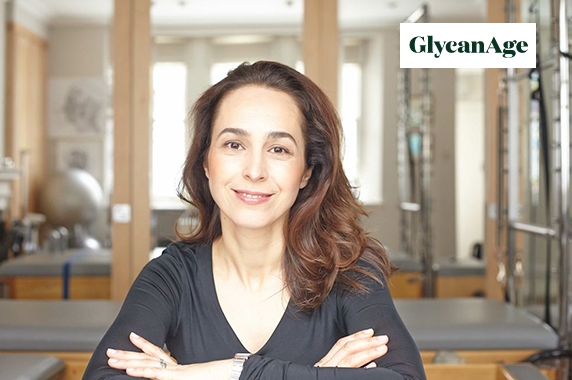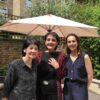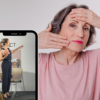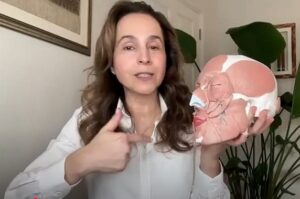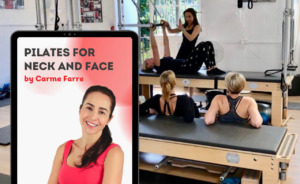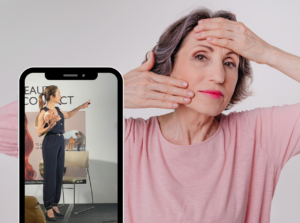Discover how Carme Farré, pilates instructor and founder of the FaceToned® Method, manages menopause while maintaining an active lifestyle. Gain insights into her approach to health and find inspiration for your own wellness journey.
We had the absolute pleasure of talking to Carme Farré, a pilates instructor and founder of the FaceToned® Method. Find out how her childhood set her up for a successful health journey and how she successfully manages menopause while staying active.
Can you share what your experience with GlycanAge has been like and have you implemented any changes after your first test?
Well, it’s been great. I really enjoyed it because it’s nice to look at the biological age, since we focus so much on the chronological age. I don’t really care how old I am because I do the same today as I did when I was 20, I have not really made any changes.
I have a very positive attitude towards ageing in the sense that for me, getting old is a privilege and it’s great. You have more experience and if you keep that excitement for wanting to do new things and being the healthiest you can be, then it’s great. So to know my biological age was brilliant in terms of confirming what I had been doing all my life has been working for me.
I’m not one of those people that suddenly had a major life event that inspired them to transform their lives. I’ve always been very much the same way, so it confirmed that what I had been doing is not only showing on the outside because, you know, people do comment that I don’t look my age, but more importantly on the inside. And that’s something that obviously I could not value myself.
So I haven’t made any major changes because what I do now is fine, it’s good. So when I had the consultation with your consultant, he suggested fasting, and we talked about supplements and the different aspects of my lifestyle.
That’s so amazing to hear, is this what first attracted you to GlycanAge? How did you find out about us?
Well, my partner is one of the investors. He told me to try GlycanAge because, even though two people can have a similar lifestyle, their biological ages could be different. So I bought it just out of curiosity. And I’ve actually recommended it to other people I know because I think a lot of people think that they can cheat.
What I mean by that is, they believe they cheat their body and be forever in a certain way. So I’ve been recommending it to people saying, check your age from the inside. Don’t look at the outside. Just look at the way you are ageing and how your body is adapting. And it’s changing over time. So yeah, that’s how I heard about it.
Amazing to hear you’re acting as our brand ambassador. Since you didn’t have this big lifestyle intervention that made you switch to healthy living, could you share what your childhood looked like?
I’m from Spain, so I think we do have a different diet, we have a Mediterranean diet and I think that’s been a major factor for me.
I’ve cut sugar almost completely, I only eat fruit. I really don’t eat any sugar or any processed food, my diet tends to be very pure. I buy fresh ingredients. So when I go shopping, it’s quite boring because I don’t buy a huge amount of things because there’s so much out there that is processed.
Growing up, we always ate vegetables, we always ate good food. We didn’t really snack much. We didn’t have a huge amount of sugar. For example, my kids, don’t really eat fast food. They’re super healthy, but they’re also learning at home, you know, copying the adults.
So it’s not like we cut it completely because it’s kind of difficult to do that when there are kids. But you kind of try to educate them so that they know exactly what’s good for them and what isn’t.
So growing up I didn’t have any snacks, we literally had barely any sugar.
You mentioned intermittent fasting. Could you describe what your regular day looks like?
Well, intermittent fasting is something that I introduced last year. I didn’t do it earlier, because I wasn’t informed as much and I didn’t really understand it. So as time goes by, you learn more and more.
I did a bit of research trying to understand what intermittent fasting really is and now I normally do 14 to 15 hours of intermittent fasting. I find it a bit difficult to do the 16 hours, and it’s not like I need to lose weight. I exercise on a daily basis, I do 1 to 2 hours of exercise. So I find intermittent fasting very helpful from a longevity point of view. But also because, I think it’s common sense that if you let your stomach and all your organs relax and not work for a few hours, they should regenerate better and be more efficient when they work.
So during the hours that I eat, I eat quite a lot. I do eat food because I need that fuel to actually be able to exercise because I love it and I do cycling and I do high-intensity training as well, together with pilates and yoga. But to be able to do it, to have that energy and to be efficient, you need to eat. And the other thing that I do, is I’ve started working on zone two.
Can you describe what that is?
Heart rate zone two. You know the benefits of the mitochondria system and how it affects longevity as well. So that’s something that I have not been doing. It was actually my partner who told me to start doing it. And in the beginning, it was a bit boring, because you need to stay in your zone.
So, for example, in my case, it’s 119 to 125 heart rate, which is not much. For example, my zone four is very efficient because I normally train at a much higher level. So that zone, the zone two, for me, it’s not efficient at all because it’s only like 6 or 7 bits, hard bits. So I’ve been doing it now for a month and I’ve already noticed it’s much more difficult for me to get to 119. Now I need to put more intensity to get my heart rate higher. So that’s how you get trained.
You need to tailor the heart rate based on yourself, on your training. So I normally train at 140 -155 heart rate, which is high, but that’s the level I like. So I’m quite efficient there. But it’s important to train also other zones as well. And one of them is zone two for longevity, actually.
And how do you de-stress?
I’m the founder of the FaceToned® method, which is a facial fitness. So I have my own app and everything, and I’ve been doing this since I was 35. FaceToned® is basically a beauty and fitness routine for the face based on the pilates technique because I’m a pilates trainer as well. So I think, you know, it’s something that we don’t look at normally.
The face is generally looked at as just beauty. It’s funny because the neck is like the bridge between beauty and fitness, and FaceToned® is the one that unites both. So that type of exercise in your face goes beyond beauty.
You can exercise your body as much as you want. And we know that, for example, if suddenly we start losing weight and don’t exercise and replace it with muscle, what happens is that your skin normally sags much more and you don’t look that great.
And it’s a shame for someone to go through a major lifestyle change and not look and feel better after it. Thanks to GlycanAge you can discover how young you really are, and with my face tone technique, you can look it as well.
It’s not about exercising just for beauty reasons. We also exercise because it makes us feel better. There’s a change, a chemical change in our body. We create endorphins. It’s like free therapy in many ways. People decide to sit on a couch watching a movie. They could be like cycling and watching that movie. And they do two things at the same time that could make a huge change inside and out.
And we tend to talk about mental health a lot, but living and actually getting older, and being able to do the same as we’ve been doing, like exercising, that will translate into our glycans and our body being younger as well and feeling well.
What would you say has been your biggest challenge on your healthy journey?
The biggest challenge probably was when I had my children. You know, I’ve always been fit and healthy, but then, in nine months my body transformed into looking very different. I think that’s why a lot of women go through this huge transformation. It’s not only physical but also mental. Because once you have a baby, there’s a change in your life that there’s nothing else like that.
It’s very easy to kind of say, well, you know, I don’t have time to move or exercise. But being able to say – I’m going to make time for myself because it is important both mentally and physically. And if I want to actually play with my children and see them grow, I need to not give up at any point.
I think that was the biggest challenge, and I think that it’s a challenge that every mom faces, not only me.
Absolutely. Since you’ve been living healthily for so long, are there any health myths you would like to bust?
Diets. They don’t work at all. I think not a single diet works. Including movement in your daily life is key. Start small by going up the stairs, don’t take the elevator. If you can cycle somewhere, cycle because you’re going to get your heart rate to zone two or three, which is very good.
Everything counts in that sense. And I think a diet that restricts caloric intake, is not going to work. However, by making the right choices, like making sure that you have a minimum of sugar and a minimum of processed foods, you’ll see better results in the long run.
Try to eat as much fresh vegetables as you can. I do eat meat because you need protein to create muscle, otherwise, you can’t. And being really, really conscious that as you get older, you need that muscle to protect your bones.
I know some women are afraid of gaining muscle, but once you get to menopause, it’s so difficult to create muscle that you shouldn’t even worry. But you need to maintain that muscle because the muscles reduce every ten years, even after menopause. So, you need to work harder than you used to work.
It doesn’t mean you need to work out for longer, but you need to wear weights on your ankles, on your arms. Make sure that you start the exercise without weights. Then you put one, two kilos, even three, you know. So increasing that weight will keep you at the same level.
Would you be open to sharing your menopause journey?
Yes, of course. I do HRT because when I started menopause at 47- 48 the biggest problem was sleeping. You know, it was so difficult to sleep. So that was the main driver of why I decided to go into HRT and start exploring it because I just couldn’t have more than four hours straight.
I was constantly waking up and I know that sleeping is one of the key components of longevity and being able to recover. So if I wasn’t able to sleep, I wasn’t able to recover. Once I went into HRT, I was able to sleep 6 to 8 hours straight. You know, it doesn’t mean I sleep like when I was younger, but I do sleep 6 hours straight normally, and then I stay in bed and maybe I sleep, you know, 8 to 9 hours. But, you know, the last two, three hours might be broken.
So and it was life-changing. And I could also start feeling it. I’ve always had a lot of energy. But, you know, with menopause, your body changes. Obviously following always doctor’s advice, I would say people go to the doctor and make sure that they don’t have any other risk. But the risk of not going on HRT is much higher than going on HRT because of cardiovascular problems, diabetes and such.
I think for any women that go through menopause, there’s a gigantic change in their bodies that people don’t really understand until they get there. But change doesn’t mean that your body needs to change. My body hasn’t changed since I was young, so I don’t look menopausal.
And to change your perception, think of it like this – you should expect to be in menopause for many more years than with the period because that means that we are living for a long time. That’s what we want.
We all remember when we had our period in the beginning and it was like – Oh my God, what’s happening with my body? What’s that change in hormones? And suddenly, you would eat and you would get fatter and you didn’t know why, there was a change in the body. And then you reset. You know, it takes a couple of years to reset.
But people should not give up. I mean, menopause is the key moment in your life that you need to really set the basis for the next 20 to 30, 40 years. And if you can do that and embrace it in a positive way, things will happen. But that’s only temporary, it’s not forever.
It’s going to help with mental health. We all talk a big game of mental health, but it’s up to us to take control of that.

